Property Fraud Alert
PROPERTY FRAUD ALERT SIGN UP NOW!
According to the FBI Property and Mortgage Fraud is the fastest growing white collar crime. It can be as simple as someone recording a document in the Buffalo County Register of Deeds office land records that fraudulently makes it appear as if they now own your property.
To address these concerns, your Register of Deeds Office have a FREE service that will NOTIFY you when or if a document is recorded that matches your personal criteria.
As, your Register of Deeds, I urge you to monitor the Public Real Estate records filed using your name.
SIGN UP NOW!!! It’s simple. Just enter your personal or business name and your contact information and you will be notified by the method selected as any documents are recorded in the future.
Buffalo County, Register of Deeds --- Kellie John
Permissive Exemptions
Property owned by religious, educational, charitable and cemetery organizations (or organizations organized and operated exclusively for the benefit of religious, educational, charitable and cemetery organizations, may obtain an exemption from property taxes in Nebraska, in whole or in part. There is a five-part test that must be met for the property to qualify. The test is:
- The property must be owned by a religious, educational, charitable or cemetery organization;
- The property must be used exclusively for religious, educational, charitable or cemetery purposes;
- The property may not be used for gain or profit for the owner or the user;
- The property may not be used for the sale of alcoholic liquor for more than 20 hours a week; and
- The property may not be owned or used by an organization which discriminates in membership or employment based on race, color, or national origin.
All five parts of the test must be met for property to qualify for tax exemption in Nebraska. An organization simply holding a tax exempt certificate from the Internal Revenue Service does not qualify property owned by the organization in Nebraska for a property tax exemption.
Permissive exemptions require an annual application with the County Assessor. In the first year for which an exemption is sought and subsequent years divisible by four, the organization seeking the exemption must file a Form 451. In the years in which the Form 451 is not required, the organization must file a Form 451A with the Assessor’s Office. Regardless of which form is required, the applications must be filed with the Assessor’s Office on or before December 31 of the year prior to the year for which the exemption is sought.
For additional questions or concerns, please contact our office:
Phone: (308)236-1210
Email: assessor@buffalocounty.ne.gov
Register of Deeds Records Online Information
Search County Land Records 24 Hours a Day!
Laredo
Designed for users who consistently search in a single county
Fidlar Software has designed Laredo, a remote access product, with your objectives in mind. Laredo’s innovative technology and 24-hour access to the county’s land records allows you to obtain information faster and more efficiently.
Benefits
- Same user interface that is used on the courthouse workstation
- Real time, 24/7 access
- Customizable results screens
- Subscription based
Cost Breakdown:
Per-minute Plan Charges
| Minutes |
Price/Month |
Overage Charge/Minute |
| 0-250 |
$75 |
$0.25 |
| 251-500 |
$125 |
$0.20 |
| 501-1000 |
$200 |
$0.15 |
| 1001-2000 |
$300 |
$0.10 |
| Unlimited |
$450 |
|
**Per minute charge for each minute over the signed-up plan
To Sign Up:
To become a Laredo Subscriber please contact the Buffalo County Register of Deeds Office @ 308-236-1239.
To Search:
Once you have signed up, and have been issued a username and password, go to the Fidlar website select Nebraska as the state, then Buffalo as the county, and click download.
Tapestry
Designed for the occasional users or those who want the freedom to search in all Fidlar counties
All you need is a web browser for 24/7 access to county land records. From the Tapestry web site, users can access information from ALL participating counties. Tapestry allows for both pay-as-you-go access, and an open account payment plan.
Benefits
- 24/7 Remote Internet access
- Secure browser based access
- Search via many data parameters (grantor/grantee, date range, document number, legal description, etc.)
Tapestry Cost Breakdown
- Index/Image Search - $6.95 per search
- Grantor/Grantee
- Beginning/Ending Date
- Consideration amount
- Legal description - Subdivision, parcel ID, Metes & Bounds
- Document search types
- Print copies - $1.00 per page
- Viewing images is included in the per search fee
Flexible Payment Options:
- Pay-as-you-go with a credit card - Visa & MasterCard accepted
- Open Account Payment Plan - $25 minimum per month
Juvenile Justice System Guide
“The only real mistake is the one from which we learn nothing.”
--John Powell
REASONS FOR BEING IN COURT
Delinquent: charged with breaking a law of a State or City Ordinance.
Status Offender: Charged with being beyond control of his/her parent(s) or habitually truant. Examples include not going to school, not keeping a curfew, running away from home, not obeying parent rules, and using drugs, alcohol or tobacco under age.
WHAT THE COURT MAY DO
Delinquent: May be placed on probation under the supervision of a Probation Officer at home or in a group home or other restricted program. The Court may alternatively place a delinquent in the custody of the State Office of Juvenile Services (OJS) / Health and Human Services (HHS) where he/she may be supervised at home, in another placement in the community (such as foster care, group home, or residential treatment), or at the Youth Rehabilitation Treatment Center (YRTC) in Geneva or Kearney.
Commitment to Office of Juvenile Services / Health and Human Services (HHS): HHS provides Court-ordered services to youth including those of the Office of Juvenile Services, the Youth Rehabilitation Treatment Centers, and Out of Home Placement.
Status Offender: Special supervision may be required. Offender may be placed at home on Probation or made a State Ward through the Department of Health and Human Services for out-of-home placement or services in the home.
YOUR RIGHTS
You have a right to:
- Know what has been filed against you;
- An attorney (a Public Defender may be provided at no cost);
- Face and cross-examine witnesses;
- Present evidence in your own defense;
- Testify if you wish; however, you do not have to testify;
- Be advised by the Judge as to what the Court can do with you; and
- Appeal the Court’s decision to the Nebraska Court of Appeals or Nebraska Supreme Court.
ADVICE FOR COURTROOM BEHAVIOR
DO…
- Dress neatly and cleanly, as you would for an important meeting.
- Be 15 minutes early, so you are ready to attend the hearing on time.
- Speak loudly and clearly.
- Be honest and make eye contact when talking.
- Respond to Judge’s questions by saying, “Yes, Your Honor,” or “No, Your Honor.”
DO NOT…
- Curse, swear or lie;
- Get angry or roll your eyes;
- Walk out of the courtroom (you could be held in contempt;
- Speak or act rudely;
- Take a cell phone into the courtroom;
- Slouch or chew gum; or
- Wear sagging pants, offensive T-shirts or gang-related items.
DETENTION
Confinement in a locked facility for a period of time until your case is tried or a more suitable placement is found.
STAFF-INTENSIVE PLACEMENT
Unlocked staff-intensive placement for a period of time until your case is tried or a more suitable placement is found.
YOU MAY BE PLACED AT A DETENTION OR STAFF-SECURITY FACILITY IF YOU…
- ...fail to follow court orders (any law violation, including Court orders to obey your parents’ rules and curfew, and/or attend school).
- ...are a runaway youth (a history of running from home or if you run from your Court-ordered placement, such as foster or group home).
- …are a danger to yourself or others (violent, aggressive, gang-related behavior or use of alcohol or drugs).
- ...are being discharged unsatisfactorily from a placement facility. If you are not following rules of your Court-ordered placement and are discharged, you may be detained.
- ...an OJS evaluation is ordered to be done residentially.

An evaluation can be ordered by the judge to be completed while you are detained.
WHEN A YOUTH IN CHARGED WITH A CRIME:
| Step |
Description |
| 1. Arrest |
Upon arrest by Law Enforcement, the Officer may: 1) Street-
release, 2) Cite and release to a parent, or 3) Arrest and get authorization to detain.
|
| 2. Detention Decision |
If recommended by Law Enforcement, a Probation Officer assesses for detention or release to parent. If detained, the Deputy County Attorney reviews all information files the appropriate Petition and requests a hearing, which should be held in a timely manner. The Court reviews all facts and determines if further detention is needed. A Petition generally must be filed within 48 hours of detention, excluding weekends and holidays. If the youth is not detained, a report is forwarded to the County Attorney for a filing decision.
|
| 3. Filing |
A petition is filed in the court, or declined. The matter might be diverted without filing a Petition. The County Attorney may decide to charge the youth in Adult Court. If charged with a felony or misdemeanor, the youth could be detained.
|
| 4. Arraignment |
Prior to the hearing, the youth meets with his/her attorney to discuss charges and how to proceed. Through the attorney, a plea of admission, denial, or no contest is entered. If the youth denies the charge(s), the Court will schedule an Adjudication Hearing. If youth admits to the charge(s), the Court will schedule a Disposition Hearing and may order evaluations.
|
| 5. Adjudication |
This is the trial of the Petition, where the State must prove up on the charge(s). If Court finds the Petition to be true, Court acquires jurisdiction of the youth and the matter is then set for disposition. If the Petition is not found to be true, the case is dismissed.
|
| 6. Predisposition Investigation |
The Court may order a predisposition investigation (PDI) by a Probation Officer prior to the disposition hearing, which involves Collecting information from the youth, his/her family, the schools, previous mental health providers, and others. This is so the Judge can make an informed decision about how best to hold the offender accountable and address his or her specific needs. More evaluations may be required (such as chemical dependency or mental health). In abuse-neglect cases, the PDI and other evaluations are done by the Office of Juvenile Services (OJS).
|
| 7. Disposition Hearing |
Based on the PDI and other case information, the Court orders a plan to ensure accountability and rehabilitation. The plan could include out-of-home placement, further evaluation, treatment, probation, intensive supervision, or other services.
|
FREQUENTLY ASKED QUESTIONS
What is Juvenile Court?
Nebraska laws have separate guidelines for juveniles (as opposed to adults, age 18 and over) who have violated the law or have other behaviors in need of intervention. Juvenile Court involvement is not considered to be a criminal record, but is intended to provide the juvenile an opportunity for rehabilitation.
What is a petition?
A petition is a legal paper, filed in the Court, outlining why you are being brought to court.
How will I know when to go to court?
You will receive a summons or letter giving the date, time, and location. The number of times you attend depends on individual circumstances. Inform the Court and Probation Officer of address or telephone changes.
What if I miss a hearing?
The judge could order you to be picked up by law enforcement, detained, and brought before the Court to explain why you ignored the Court’s notice.
What if I do not follow the Court’s rules?
A motion to review or revoke your placement or probation may be filed by the County Attorney, asking the Court to place more severe requirements on your probation or place you in an institution or state juvenile correctional facility.
Can my record be sealed (kept confidential)?
You may ask the Court to seal your records. This sets aside the record and it cannot be opened without Court approval and good cause. However, even if sealed, certain persons or agencies may still be able to access your records.
What if I waive the right to an attorney?
If you do so, you would be representing yourself. If you do not have an understanding or knowledge of legal options and process (such as motions to make, how to call and examine witnesses, and how to request services from the Court), you may be adversely affected. Remember, you can request an attorney to represent you at any point in the process.
| Office |
Phone Number |
| Attention Center |
(308) 236-1922 |
| County Attorney’s Office |
236-1222 |
| County Court |
236-1228 |
| City of Kearney Attorney’s Office |
237-3155 |
| Crisis Assistance Center |
(800) 325-1111 |
| Detention Center |
(308) 233-5281 |
| District Court |
236-1246 |
Health & Human Services (HHS)
• Geneva/Kearney
• Office of Juvenile Services (OJS)
• Out-of-home Placements
• Youth Rehabilitation and Treatment Centers
|
865-5592 |
| Juvenile Diversion |
236-1922 |
| Truancy/Juvenile Diversion |
236-1920 |
| State Probation |
236-1251 |
| Buffalo County Sheriff |
236-8555 |
Kearney Police Department
• non-emergency
• EMERGENCY
|
237-2104
911 |
| Family Resource Council |
237-4472 |
| Nebraska Workforce Development |
865-5404 |
Region III
• Early Intensive Care Coordination
• Professional Partner Program
|
237-5113
Ext. 238
Ext. 238 |
| Buffalo County Community Health Partners |
865-2284 |
Each individual is entitled to be, and is capable of being, responsible for his or her lawful participation in society.
Revised from the Crime Commission brochure “A Guide to Juvenile Court for Parents & Children.”
A printer-friendly version of this page is available.
Domestic Violence
Purpose:
This Division seeks protection for victims of violence in intimate relationships through aggressive and consistent prosecution of offenders.
The Buffalo County Attorney recognizes the importance of communicating and cooperating with law enforcement and other public and private community agencies that provide services to families, victims, and perpetrators of domestic violence. A specialized Domestic Violence Prosecution Unit, in coordination with other community agencies, provides the best opportunity to achieve the following goals:
- To stop the violence.
- To protect the victim from additional acts of violence committed by the Defendant.
- To protect the children or other family members from exposure to, or possible injury from, domestic violence.
- To provide restitution to the victims.
- To hold the offender accountable for their violent conduct.
Policy:
The State of Nebraska has a critical interest in reducing the number of incidents of domestic violence and increasing the number of positive results in domestic violence prosecutions.
It is the position of the Buffalo County Attorney that the aggressive prosecution of domestic violence is necessary to protect victims and future victims of domestic violence.
Resources and Information
IF YOU OR SOMEONE YOU KNOW NEEDS HELP, CALL:
NATIONAL DOMESTIC VIOLENCE HOTLINE
(800) 799-7233
NATIONAL SEXUAL ASSAULT HOTLINE
(800) 656-4673
NEBRASKA DOMESTIC VIOLENCE/SEXUAL ASSAULT HOTLINE
(800) 876-6238
LINEA DE CRISIS EN NEBRASKA (EN ESPANOL)
(877) 215-0167
DO NOT USE E-MAIL TO REPORT CASES OF ABUSE.
IF THERE IS AN EMERGENCY CALL LOCAL LAW ENFORCEMENT IMMEDIATELY.
|
|
The S.A.F.E. Center
(The Spouse/Sexual Abuse Family Education Center)
3710 Central Avenue, Suite 10
Kearney, NE 68847
(308) 237-2599
(877) 237-2513
http://www.safecenter.org
All Services are Free & Confidential
24-hour Crisis Line
Crisis Support
Emergency Shelter
Support Groups
Supportive Atmosphere
Liaison with Community Agencies
Public Education Presentations
Protection Order Advocacy
Information & Referrals for:
Counseling, Housing, Legal Alternatives,
Emergency Assistance and much more!
Follow-up contact
|
|
Breaking the Silence: Information for Victims of Intimate Violence
A Victim’s Guide to the Nebraska Criminal Justice System
VINE (Victim Information and Notification Everyday)
VINE is a free automated service that monitors the custody status of adult inmates in all county jails and state prisons. You can arrange to receive telephone and e-mail notification when an offender’s custody status changes. Updated information is available 24 hours a day. VINE is available in English and Spanish and supported by 24-hour operator assistance.
The Nebraska VINE service is provided by the Nebraska Sheriff’s Association, Nebraska Domestic Violence Sexual Assault Coalition, Nebraska Coalition for Victims of Crime, Nebraska County Attorneys’ Association, Nebraska Department of Correctional Services, Nebraska Crime Commission and CJIS Advisory Committee.
NEBRASKA VINE NUMBER: 877-NE 4 VINE or (877) 634-8463.
Register or Find an Offender Online at www.vinelink.com
A Summary of Nebraska’s Legal System
Other Resources
Nebraska Department of Health and Human Services
Nebraska Domestic Violence/Sexual Assault Coalition (NDVSAC) and Hotline
Brochure
(800) 876-6238
National Domestic Violence Hotline
(800) 799-SAFE (800-799-7233)
US Department of Justice
Violence Against Women Website
Minnesota Center Against Violence and Abuse
National Organization for Victim Assistance
800-TRY-NOVA (800-879-6682)
National Victim Center
800-FYI-CALL (800-394-2255)
National Center for the Prosecution of Violence Against Women
National Center for Victims of Crime
Domestic Violence FAQ
What is a crime of Domestic Violence?
A crime of Domestic Violence (DV) is any crime involving individuals who are currently or have had in the past an intimate and/or dating relationship. It may include a physical assault. It may also include, but is not limited to, the following types of cases: damage to property, theft, refusing a request to leave, violation of a protection order, disorderly conduct, disturbing the peace, etc.
A police report has been filed and the suspect was not arrested at the scene. What happens next?
If they were not arrested at the scene and the crime involves Domestic Violence (DV), the police report will be further investigated by law enforcement. If that further investigation reveals sufficient evidence to believe a crime has been committed, the police will give that information to the County Attorney’s office for review. If the police do not believe a crime has occurred or that there is insufficient evidence to proceed in a criminal case, no further action will be taken.
If the County Attorney’s office believes sufficient evidence exists, appropriate charges will be filed, which may include the prosecutor’s request of the County Court for an arrest warrant for the suspect.
A police report has been filed and the suspect was arrested at the time of the incident or arrested on a warrant, what happens next?
The next step is usually an arraignment hearing. Arraignments are generally done every weekday at 1:30 p.m. on the next business day after the arrest, excluding holidays. The Judge will tell the defendant what they are charged with and the possible penalties. They will be granted an appearance bond, which will require that they have no contact with their victim. That means they are not to visit, telephone, e-mail, text, or in any way communicate with their victim. The accused will have the opportunity to hire an attorney, or be appointed one if they cannot afford one. The defendant may enter a plea of guilty or no contest, and the next hearing will be a sentencing; or a plea of not guilty, and a trial date will be set.
The Judge issued a No Contact Order, what does that mean?
It is a condition of bond in all cases of Domestic Violence, issued by the Judge at arraignment that forbids contact with the listed victim, or victims, until the case is resolved. It is the policy of the Buffalo County Attorney’s Office to uphold and defend that “No Contact Order,” even if the victim does not wish one. The Defendant may be charged with an additional crime if he/she violates that order, and may also have his/her bond revoked or increased as a result of violating said order.
How can I find out if an offender is still in jail?
Contact VINE at 877-NE 4 VINE or (877) 634-8463, or online at www.vinelink.com.
I posted bond for someone, how do I get that money back?
If a Defendant can post the bond, it will be released to the Defendant, regardless of who posted the bond. The bond will be released upon the resolution to the defendant, unless otherwise ordered by the court.
What if I want to drop charges and/or recant the statements made to the Police?
Our office will not drop charges, generally speaking. Charges are filed by the State of Nebraska, not the alleged victim. It is the best interest of the State of Nebraska and the alleged victim to see that any person accused of Domestic Violence be held accountable for their actions. Domestic Violence poses a danger not only to the victim, but also to the victim’s family and society as a whole. The State of Nebraska has a “no-drop” policy to protect not just the individual victim and to ensure that there is no further violence perpetrated by the accused.
What will happen at a trial?
There are two types of trials: Jury or Bench. A Bench trial is decided by a judge only. A Jury trial is decided by a group of citizens. At both trials there is evidence presented. The witnesses will testify as to what they saw and heard. Evidence may include witness testimony, copies of 911 call recordings, photographs of injuries and the scene, hospital and doctor reports, telephone records, and more. The witnesses will be cross-examined. After all of the evidence is presented there will be a decision of guilty or not guilty.
Will I have to testify?
The majority of DV cases are resolved prior to trial by a plea agreement. However, if such an agreement cannot be reached, you will receive a subpoena that court-orders you to appear and testify at trial.
What could the potential sentence be upon a finding of guilt?
The sentence depends upon the crime charged. Judges have great latitude in sentencing offenders. They may order the defendant to pay a fine, be placed on probation, or serve time in jail or prison, or may order a combination of those things.
As a part of probation, a judge may order the defendant to pay restitution. In order for restitution to be paid, the defendant must be eligible to be placed on probation OR to have posted sufficient bond to pay the requested amount of restitution. Only those victims listed in a police report who have been reported to have damage to property may be given restitution. Victims may be required to submit a victim impact statement and documentation for any restitution they desire. If no restitution is at issue, a victim may, through a victim impact statement, tell the sentencing judge in writing how they feel about the event and what they think ought to be done with the offender.
How do I find out what time/date the trial will be?
Victims and witnesses will be personally notified in writing of the date, time, and location of the trial. Victims and witnesses will receive a letter and legal document called a subpoena that court orders them to appear on the date of trial. It is important to communicate with the prosecutor in preparation for trial.
What if I received a subpoena but cannot testify?
A subpoena is a legal document that court orders someone’s appearance. If that person choose to ignore the subpoena and does not appear, a judge may find them in contempt of court and issue a warrant for their arrest.
If you cannot appear for some legitimate reason, you should call the prosecutor assigned to your case and explain. The prosecutor may then ask the court to continue the trial or hearing, and there may be a hearing on that request. The hearing will be held in front of the judge assigned and the Defendant and his/her attorney will be present. Continuances are only granted in extreme circumstances.
What is my role in the case and how/when will I be contacted?
The Buffalo County Attorney’s Office encourages victims to be involved in the legal process. A member of our office or the Kearney Police Department Victim/Witness Unit will contact victims to let them know when a Defendant is scheduled to be arraigned, and also after the arraignment so that they have information as to future court dates, appearance bonds, and any other conditions of a Defendant’s release.
The prosecutor assigned to the case is also available to answer any questions a victim may have, and to consult with them regarding any potential plea agreements negotiated with the defendant’s attorney. The victim will be notified of any pending sentencing dates or other important hearings.
For information about the status of a case, call the Kearney Police Department Victim/Witness Unit at (308) 233-5263, or call the County Attorney’s Office at (308) 236-1222.
Where can I get help?
You are not alone in this process. There are several organizations that specialize in domestic violence issues that are waiting to help you through the process. The Kearney Police Department Victim/Witness Unit (308-233-5263) is here to provide support services for you. The S.A.F.E. Center also offers many resources for victims of domestic violence and their families.
How can I get a Protection Order?
If you are in fear of your safety, you may obtain a court order to prevent an individual from contacting you. Information and downloadable forms are available online. Or, contact the Buffalo County Clerk of the District Court to obtain them. The S.A.F.E. Center can be a source of information also. Finally, the Kearney Police Department’s Victim/Witness Unit can provide information.
Child Support
Please understand, the Division represents the State of Nebraska. We cannot represent people who owe child support, nor give legal advice, nor assist you in selecting an attorney. Consult your local yellow pages or other resources for attorneys who practice in this field.
Purpose:
The Child Support Enforcement Division prosecutes individuals civilly for payment of their child support obligations. Under appropriate circumstances, the Buffalo County Attorney's Office criminally prosecutes non-payers of child support.
Nebraska has centralized child support collection and disbursement. All child support payments must be sent to the Nebraska Child Support Payment Center to ensure prompt processing:
Nebraska Child Support Payment Center
P.O. Box 82600
Lincoln, NE 68501-2600
Or online at www.nebraskachildsupport.com.
The Nebraska Child Support Call Center is your source for information and the latest updates about your child support case: (877) 631-9973.
Requests for review and modification of child support orders at least three years old may be made to Nebraska Department of Health and Human Services at (800) 831-4573. If calling from outside Nebraska, call (402) 471-9103. Or online at www.dhhs.ne.gov/cse/cseindex.htm.
Businesses which are under court order to withhold child support and/or spousal support payment from the payroll of their employees should send payments to:

Nebraska Child Support Payment Center
P.O. Box 82890
Lincoln, NE 68501-2890
About Child Support Enforcement:
The Nebraska Child Support Enforcement (CSE) Program is designed to locate non-custodial parents and obtain financial support for their children. The Nebraska CSE Program is administered by the Nebraska Department of Health and Human Services. CSE provides the following services:
- Locate non-custodial parents
- Establish paternity
- Establish and enforce medical support
- Enforce and collect support payments
All parents with minor children who would like child support services are eligible. The CSE Program works closely with these agencies:
- Nebraska Department of Administrative Services
- Internal Revenue Service (IRS)
- Nebraska Department of Revenue
- District and County Courts
- Nebraska Department of Labor
- Nebraska Department of Motor Vehicles
- Federal Parent Locator Service
- Sheriffs
- Child Support agencies in all states
- Federal Office of Child Support Enforcement
- Credit Reporting Agencies
- Nebraska Payment Center
The same location resources and services are available in all states. Interstate cases are more difficult and generally take longer. However, with new federal legislation and more computer links between states, interstate enforcement of child support is improving.

If you are ordered to pay child support:
- All payments must be made to:
Nebraska Child Support Payment Center
P.O. Box 82600
Lincoln, NE 68501-2600
- If you pay the other party directly, you may not receive credit for the payment.
- Child support payments are due on the first of each month and are delinquent the next day. Interest is charged on the delinquent amount after 30 days.
- Income withholding will be implemented in all cases involving child support whether there is delinquency or not (including unemployment withholding).
- You MUST pay child support regardless of custody or visitation issues.
- Health insurance MUST be provided for the child(ren) if ordered by the Court.
- If you have more than one order or judgment, your payments will be allocated between them. You cannot select which obligation to pay.
- Not paying child support can result in:
- State and Federal Income Tax Intercepts
- Drivers License Suspension
- Suspend Professional Licenses
- Suspend Eligibility For Hunting and Fishing Licenses
- A Report to Credit Agencies
- Denial of Your Passport
- Lottery Prize Intercept
- Liens/Seizure of Property
- Seizure of Bank Accounts
- Criminal Charges
- Jail
If you are ordered to receive child support:
- You can apply for child support services by contacting your local Health and Human Services office or County Attorney.
- If you or your child(ren) are receiving Temporary Assistance for Needy Families (TANF) payments, the child support will be assigned to the State of Nebraska.
- DO NOT accept child support payments directly from the non-custodial parent. All payments must be made through the Nebraska Child Support Payment Center in order to be properly credited.
- If the non-custodial parent has more than one order or judgment, all payments received will be allocated proportionately between them.
- Your court order may contain language prohibiting you from removing the child(ren) from the State without the Court’s consent. It is your responsibility to know what the Court’s order says and to comply with it. Failing to do so may result in the suspension or termination of child support.
- Visitation cannot be withheld for non-payment of child support. Withholding visitation can:
- Affect your child’s well-being
- Result in a finding of contempt of court
- Put you in jail

Did you know…?
- Child support is due through the month that the child turns 19.
- Employers who fail to comply with incoming withholding notices or who punish or dismiss employees as a result of income withholding are subject to legal action.
- The County Attorney (or authorized attorney) represents the State and the best interests of the child. No client/attorney relationship exists.
- Either party in an action for child support can request that the case be reviewed for possible modification every three years by contacting Health and Human Services, Child Support Enforcement, Review and Modification Unit at (800) 831-4573.
- Establishing paternity enables your child(ren) to have access to important family medical history as well and financial and emotional support.
If you need further assistance or have questions regarding Child Support Enforcement, contact your local County Attorney or call the Nebraska Child Support Customer Service Call Center at (877) 631-9973. Or write to:
HHS-CSE
P.O. Box 94728
Lincoln, NE 68509
www.hhs.state.ne.us/cse/cseindex.htm.
Criminal Division
Purpose:
The Criminal Division of the Buffalo County Attorney's Office is responsible for the prosecution of all crimes that occur within Buffalo County.
The Attorneys of the Criminal Division make filing decisions after reviewing reports generated by local law enforcement agencies. Those agencies include Buffalo County Sheriffs Office, Kearney Police Department, Nebraska State Patrol, Nebraska Game and Parks, Shelton Police Department, and the Ravenna Police Department.
Mission:
The mission of the Criminal Division is to actively investigate and aggressively prosecute crimes that occur in Buffalo County. Using advanced trial practices, research, and technology, it is our goal to prosecute those individuals that cause harm to the citizens of Buffalo County. We will work with the community, law enforcement, and government agencies to not only prosecute crimes, but to proactively search for ways to protect the community.
Objectives:
- To work with the community and build a relationship of trust and understanding in order to work proactively to prevent crime.
- To use research and investigative techniques to ensure quality criminal prosecutions for the citizens of Buffalo County.
- To improve our understanding of the law and the community through seminars, training, and continuing education programs.
- To use technologically-advanced trial practices.
- To apply the law in an unbiased and consistent manner to ensure justice, equality, and safety for the community.
Services:
We are here to assist those individuals who are victims of crimes that occur in Buffalo County.
If you believe you have been a victim of a crime or have information about a crime, please contact one of the following agencies or your local police department:
Once a report has been filed with the appropriate law enforcement agency, the case will be given to the County Attorney for review and prosecution. The Deputy County Attorney in charge of the case will contact the victims and witnesses to ensure that the best possible prosecution can be had.
Child Support Enforcement FAQ
Do you charge for your services?
There is a $25.00 annual fee for child support enforcement services, but you will not be billed or asked to pay the fee directly. Instead, the fee is collected out of child support payments made by the person owing the child support. The fee is collected in cases where at least $500.00 per fiscal year (Oct. 1-Sept. 30) in child support is collected. Under no circumstances will parents who are receiving state aid be required to pay a service fee.
What services do you offer?
We offer paternity establishment services, as well as enforcement services for existing child support, spousal support, and medical support orders.
Must I live in Buffalo County to make use of your services?
If you are a Nebraska resident applying for paternity services, you should contact the child support office in the county where you live. That would typically be your local County Attorney’s Office. If you live in Buffalo County, contact us at the address above. If, on the other hand, you live in another county and have a support order already existing, you should contact the child support office in the county where that order exists, even if you have moved to another county since then. If you child support order comes from another state, you may either work through your local county child support office, or contact the child support office in the other state directly.
Do you handle custody or visitation issues?
No. State law prohibits us from assisting on these issues. You should contact private counsel to assist you, or contact Legal Aid of Nebraska to see if you qualify for their services. Some employers offer legal insurance plans, much like medical insurance, so check to see if your employer offers such assistance.
I was previously ordered to pay child support, but now my child lives with me. Can you stop my child support order, and help me get a new one where the other parent pays me instead?
Only a court can legally change an existing child custody order. Courts determine what is in the “best interests” of the child when they issue a custody order, and parents cannot agree between themselves to override a judicial determination. A child support enforcement office is not authorized to become involved with custody determination issues. You should consult a private attorney to assist you.
The other parent of my children has a violent temper, and has threatened to hurt me and/or our children if I pursue them for child support. What can you do to help me?
We are very aware that many couples separate because of domestic violence issues. Your safety, and the safety of your children, is our #1 concern. Everyone who applies for child support or paternity services, whether through an HHS caseworker or directly with our office, will be asked about this potential problem. If you tell us you are concerned about the potential for family violence, we will give your case special treatment. Each case is handled on its own set of facts. A decision may even be made not to pursue the other parent due to the threat of his or her becoming abusive to you or your children.
If you have immediate concerns about possible violence to you or your children, we urge you to call 911. Otherwise, contact the SAFE Center.
I already have an existing child support order, but now the noncustodial parent is making much more money. Can my support order be modified to have the other parent pay me more support?
Yes. Whenever (1) there is a material change in financial circumstances of a parent who is ordered to pay support, (2) the change of financial circumstances was unforeseen at the time your support order was entered, (3) the change in circumstances has lasted at least three months, and is expected to last at least six additional months, and (4) the modification request is processed through the HHS Review & Modification office, your support order may qualify for modification. A “material change in financial circumstances” usually means an increase or decrease of support by at least 10% but not less than $25.00. If you (or the other parent) continue to live in Nebraska, and if your order is at least 3 years old, you may ask the State to process your request for a modification free of charge. Contact the HHS Review & Modification office at (800) 831-4573 for more information, or see Creating or Changing a Court Order. If your order is less than three years old, or if neither parent continues to reside in Nebraska, you would be responsible for pursuing your modification request on your own, with your own attorney. See the Nebraska Child Support Guidelines for more information.
I am ordered to pay child support, but I no longer earn as much as I used to, and I have been unable to find similar employment that pays as much as my old job. Can I get my child support reduced on account of my earning less now?
Possibly. Child support can be modified either upward or downward if the circumstances justify it. Generally, child support may not be reduced unless the parent who is ordered to pay support suffers a long-term reduction in their earning capacity or income through no fault of their own. Examples of this would include corporate downsizing, the elimination of specialized work that cannot easily be replaced at the same pay level, or a medical disability or injury that occurs to the parent who pays support. Incarceration is, by itself, usually not considered to be valid grounds for a reduction in child support.
If you believe you qualify for a support reduction, and want to expedite the matter, you should contact a private attorney to assist you in your efforts. Otherwise, you (or the other parent) may contact the HHS Review & Modification office at (800) 831-4573 for further assistance free of charge.
How long does it take to have a support order modified?
Every case is unique, but from the time contact with the HHS Review & Modification office is initiated until the time that the court has a final hearing on a request to modify child support of child support, nine to 12 months may pass. Typically the first three to four months of the time is taken up in the HHS review process. If the case meets a preliminary finding that a modification is appropriate, the request will be transferred by HHS to the local child support office for further review, and the possible filing of a complaint to modify support. Depending upon any delays in obtaining court service of process on the other parent, delays caused by legal motions or court scheduling issues, the modification case should be ready for trial and decision about four to six months after it is filed.
Why can I not call your office directly to discuss my case?
Several years ago Nebraska, like all 50 states, went to a centralized customer call center. This center is staffed by highly trained personnel who are able to immediately answer or assist about 90% of all callers. Most calls are of a “routine” nature, such as checking to see if payments have been credited, wanting to confirm court hearing dates, providing a change of address, employer or phone number. Whenever necessary, the call center will electronically contact a local child support office with a customer concern that needs additional attention. Some of those calls do lead to phone contact between local staff and our customers. By answering 90% of caller questions, the call center frees up valuable time for the local child support workers to perform their duties on an uninterrupted basis, adding to their productivity. It is a “win-win” arrangement for everyone. Call the Child Support Call Center at (877) 631-9973, or the HHS Review & Modification office at (800) 831-4573.
My case is classified as “Interstate” in nature, because I live in a different state from the other parent. Does this mean that I will not be able to get the help I need?
No, definitely not. It is true that interstate cases often take longer to work successfully than cases where everyone still lives locally. About 15-20% of our caseload is interstate. In most of those cases our staff will need to work with other child support offices, sometimes in more than one other state, in order to secure the cooperation necessary to establish a new support order, or enforce an existing order. The extra “hoops” that must be jumped through mean that legal actions do take longer to complete. We have found that many other child support offices are overstretched in terms of personnel and funding, and thus are unable to assist us as quickly as they might like. In addition, sometimes when parents leave one state they move in order to evade their child support orders. Some people become very good at hiding from law enforcement. Fortunately, our tools for finding them continue to get better all the time as well.
What sanctions are used to force parents to pay their child support?

Most parents with child support orders pay regularly. Most do so on their own; others need a degree of prompting. Income withholding, civil contempt of court, license suspension, bank account seizure, passport denial, tax refund intercept, and even criminal actions are among the more readily used tools at our disposal to enforce terms of court orders. The simplest, quickest and least expensive enforcement techniques are used first, and often get the results we seek.
I owe child support, but I never get to see my child. Why should I have to pay support when I do not get the parenting time I deserve?
Nebraska law is clear: An obligation to pay child support is completely separate and distinct from the right to exercise parenting time. The failure to obtain court ordered parenting time (sometimes called visitation) does NOT justify the non payment of support. Also, the failure to receive child support does NOT justify a refusal to allow the other parent to exercise their court ordered parenting time. Just as our judges will not tolerate persons who willfully fail to pay their support on time, those same judges will not tolerate parents who refuse to allow the other parent court ordered parenting time with their children. The method of enforcing a problem with parenting time is to take the other parent back to court for allegedly being in contempt of the court order. A private attorney can provide needed expertise to accomplish this task.
What is the age of emancipation in Nebraska?
Emancipation age in Nebraska is presently 19, and child support must be paid until the month and year the child reaches that age. In most other states the age of emancipation is 18. Some states (not Nebraska) allow for support orders to continue beyond the age of the child’s emancipation if the child is still a full time high school student. Look to the language in your support order to see how long your child support is to continue.
Bad Checks
Purpose:
The Division is responsible for processing and follow-up investigation of any Non-Sufficient Funds or Account Closed checks that are submitted for criminal prosecution.
Victims of bad checks, who are considering criminal prosecution of a suspected bad check writer, must submit the original check(s) in question, or what is provided to them by the bank, along with the statutorily-mandated fee of $10.00 per check.
 Should the victim so desire, a criminal arrest warrant may be issued for the check writer. In order to successfully prosecute bad check offenders, it is necessary that we receive certain information about the bad check writer. This increases our chances of proving the case in court and obtaining full restitution for the victim.
Should the victim so desire, a criminal arrest warrant may be issued for the check writer. In order to successfully prosecute bad check offenders, it is necessary that we receive certain information about the bad check writer. This increases our chances of proving the case in court and obtaining full restitution for the victim.
You may establish your own business or personal procedures regarding what types of checks you will accept. For purposes of criminal prosecution, however, you should not accept a check from any individual who cannot produce a valid photo identification that matches the account name on the check. The most helpful information for merchants to note on a check they are receiving is the date of birth of the individual, and the driver’s license number with issuing state. This information should always be written on the check by the merchant’s employee rather than the check writer. Your employee should also note that they compared the photo ID to the check writer with a notation such as, “I.D. checked.” Furthermore, your employee should note their own initials on the check to identify the employee who received the check. This is necessary because it is often most difficult to prove in court the person who wrote the bad check is the same as the person charged with the crime.
To help us collect the information, please complete our Request for Criminal Prosecution on Bogus Checks form. The information is vital to obtain an arrest warrant and prove the identity of the issuer of the bad check. Although we take the initial steps toward obtaining restitution for you, without your cooperation we may not be able to prosecute the case.
Please contact our office at (308) 236-1289 if you have questions.
Marriage License
Requirements for a marriage license issued by Buffalo County:
| 1. |
Applicants must be at least 17 years of age to be married in the state of Nebraska. Parental consent is required for applicants who are 17 or 18 years of age. The parental consent forms are available at the County Clerk's office.
|
| 2. |
Both applicants must appear together at the County Clerk's office between the hours of 8 a.m. and 4:30 p.m. on weekdays.
|
| 3. |
The fee for a marriage license is $25.00, CASH ONLY. (See our ATM locations in the courthouse.) |
| 4. |
Must present photo identification. A valid driver's license from any U.S. state, Nebraska ID card, U.S. Passport, U.S. Military card, or a Foreign passport are acceptable forms of photo identification. All documents will be in English or translated by a certified court translator. Proof of citizenship or immigration status is neither relevant or required.
|
| 5. |
Need to know birthplace for both applicants. |
| 6. |
Need to know full names and birthplaces of parents.
|
| 7. |
If a social security number has been issued to the applicants, we will need that information. The issuance of a social security number to either applicant is not required to obtain a Marriage License.
|
| 8. |
If there were any previous marriages we will need to know how they ended (divorce, annulment or death) and the date the divorce was final or the date of death. If there is a previous divorce, a new license will not be issued and you cannot remarry until at least six (6) months and one (1) day have passed from the date the Decree was signed by the judge and filed with District Court.
|
| 9. |
The Marriage License is good for one year from the date of issuance and can be used in any County in Nebraska.
|
| 10. |
All marriage licenses obtained in Nebraska are public record.
|
All marriage licenses obtained in Nebraska are public record.
For information about scheduling the Buffalo County Court Magistrate to conduct a marriage ceremony, contact Sharmin Gonzales at sharmin.gonzales@nejudicial.gov or 308-236-1229.

Certified copy of a Buffalo County marriage license
To Receive a Buffalo
County certified marriage license either stop by the clerk’s office with $9.00
cash or send a $9.00 money order and the following information:
- Name of Applicant A/Groom
- Name of Applicant B/Bride
(including maiden name)
- Date of marriage (Must be issued from Buffalo County)
Mail to:
Buffalo County Clerk
PO Box 1270
Kearney, NE 68848-1270
If you have any questions, contact us by:
Phone: (308) 236-1226
E-mail: clerk@buffalocounty.ne.gov

Changing name after
the wedding
This is a personal decision. You may choose to keep your name but if you decide to change your name legally, you should do the paperwork as soon as possible after you're married (or after your honeymoon). Many entities will require you to present a certified copy of your marriage license as proof of legal status to make your name change. Photocopies and keepsakes are not recognized by most government offices as proof of marriage. The following is a list of what may need to be updated.
- Social Security Card (require certified copy)
- Bank, credit union, and investment accounts
- Vehicle title/registration
- Driver's license (require certified copy)
- Mortgage
- Homeowner's insurance
- Life insurance
- Car insurance
- Medical and dental records
- Credit cards and files
- Deeds and property titles
- Passport
- Voter registration card
- IRS forms
- Church records
- Mail and newspaper subscriptions
- Employer/payroll
- Post office
- Your attorney (to update legal documents, will)
- Military records
- Utilities/Subscriptions
Return to top
THIS INFORMATION IS SUBJECT TO CHANGE WITHOUT FURTHER NOTICE.
Safe Room Q & A
What is a safe room? What are the design requirements for a FEMA safe room?
A safe room is a hardened structure specifically designed to meet FEMA criteria and provide "near-absolute protection" in extreme weather events, including tornadoes and hurricanes. The level of protection provided by a safe room is a function of its design parameters, specifically the design wind speed and resulting wind pressure and the wind-borne debris load resistance. To be considered a FEMA safe room, the structure must be designed and constructed to the guidelines specified in FEMA P-320, Taking Shelter
from the Storm: Building a Safe Room for Your Home or Small Business (FEMA, third edition, 2008a) (for home and small business safe rooms). Additionally, all applicable Federal, State, and local codes must be followed. When questions arise pertaining to the differences between FEMA P320 criteria and another code or standard, the most conservative criteria should apply.
Should I have a safe room?
Pages 6 through 10 of FEMA P-320 (FEMA, 2008a) provide background information to help homeowners decide if a safe room is needed in their home. Homeowners and small-business owners should also refer to the Homeowner’s Worksheet, Assessing Your Risk (Table I-1) in FEMA P-320 (FEMA, 2008a); this is an easy-to-use matrix that helps users decide whether a safe room is a matter of preference, should be considered, or is the preferred method for protection from extreme winds.
My house has a basement. Do I need a safe room?
Some strong tornadoes have resulted in loss of floor framing, collapse of basement walls, and death and injuries to individuals taking refuge in a basement. What constitutes an acceptable level of protection is an individual decision. A basement may be the safest place to seek shelter for homes without a safe room, but it will not provide the same level of protection as a safe room unless it has been designed and constructed to provide the level of protection in accordance with FEMA P-320 (FEMA, 2008a) and FEMA P-361 (FEMA, 2008b).
A basement is a good location to install a shelter or build a safe room, but access for handicapped or physically challenged individuals may be limited. The flood risk of your location may also affect whether it is appropriate to place a safe room in your basement. If your house or neighborhood is prone to flooding, the basement may not be an appropriate location for taking refuge.
Where can I find information about obtaining FEMA funding to construct a safe room? Are there any funds available in my area?
For project eligibility and financial assistance questions, please contact your Local Emergency Manager. Your Emergency Manager can advise you on what information must be provided for your project to be considered for funding, as well as any applicable Federal, State, and local design requirements.
Can I still apply for FEMA funding after I have begun construction of a safe room or purchased a safe room?
No. You must apply for funding before the purchase of a safe room or beginning any construction. Section D.2, Part III of FY 2011 Hazard Mitigation Assistance Unified Guidance (FEMA, 2010) states that costs related to projects for which actual physical work (such as groundbreaking, demolition, or construction of a raised foundation) has occurred prior to award or final approval are ineligible.
What costs are eligible for funding under a safe room grant?
Allowable costs for safe room projects funded under FEMA’s Hazard Mitigation Grant Program (HMGP) are those components related to, and necessary for, providing life safety for building residents in the immediate vicinity during an extreme-wind event. The funding covers design and building costs related to structural and building envelope protection. The funding covers both retrofits to existing facilities and new construction projects, and applies to both single- and multi-use facilities.
Eligible costs are only those consistent with FEMA-approved performance criteria as provided in FEMA P-320 (FEMA, 2008a). These criteria are summarized in Table 6 (below) of the 2011 FY FEMA Hazard Mitigation Assistance Unified Guidance (FEMA, 2010). (Click the table to view it larger.)
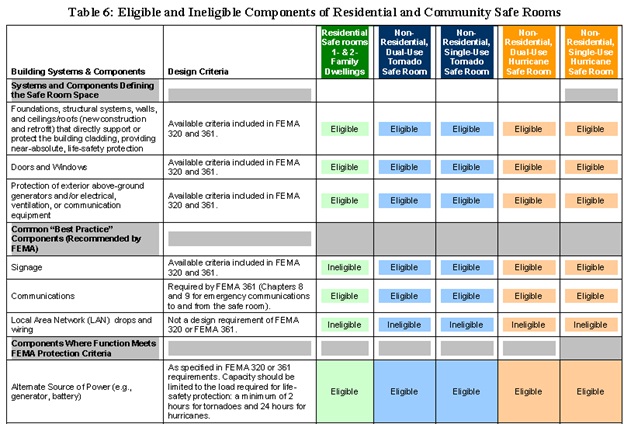
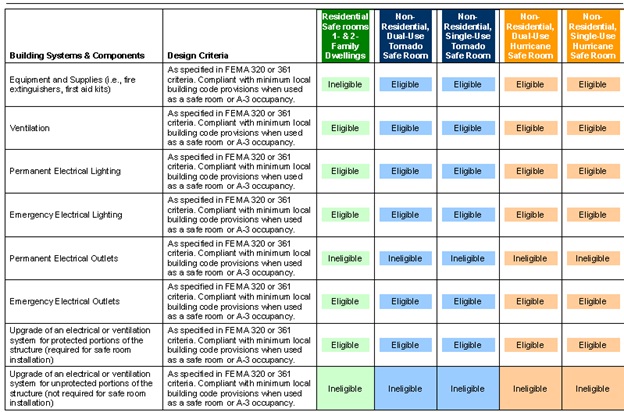
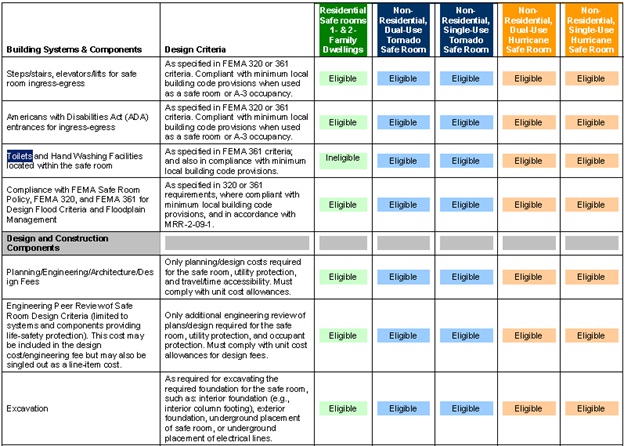
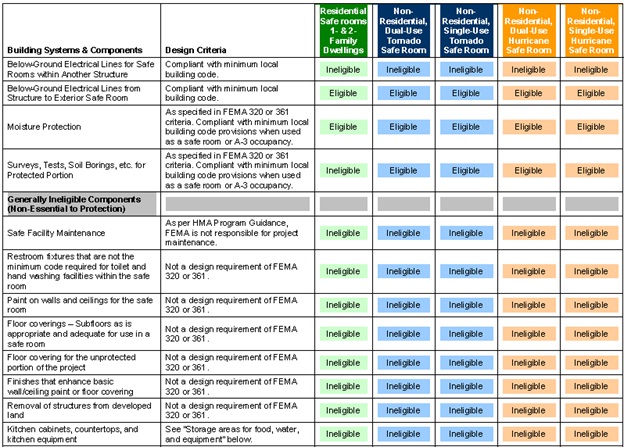
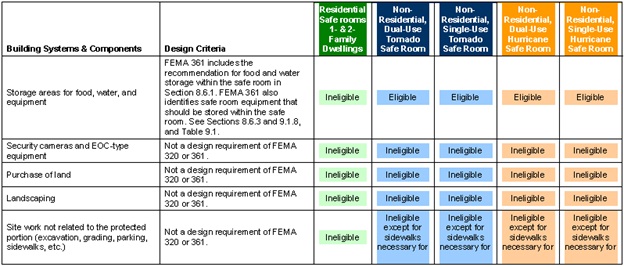
Does FEMA approve, endorse, or certify any products?
No. Federal No. Federal policy does not allow FEMA to approve, endorse, certify, or recommend any products. While a product may be in compliance with FEMA design guidance, any language from manufacturers stating their product is "FEMA approved" or "FEMA certified" is incorrect.
What is the recommended square footage per person for a residential tornado and hurricane safe room?
For residential safe rooms, the usable tornado safe room floor area should be the gross floor area minus the area of sanitary facilities, if any, and should include the protected occupant area between the safe room walls at the height of any fixed seating, if it exists. The minimum recommended safe room floor area per occupant for residential tornado and hurricane safe rooms is provided in table below. (Click the table to view it larger.)

What is the cost of installing a safe room in a new home or small business?
Costs for construction vary across the United States. The cost for constructing a safe room that can double as a master closet, bathroom, or utility room inside a new home or small business ranges from approximately $6,600 to $8,700 (in 2011 dollars). This cost range is applicable to the basic designs in FEMA P-320 (FEMA, 2008a) for an 8-foot by 8-foot safe room (approximately 64 square feet of protected space). Larger, more refined designs for greater comfort cost more, with 14 foot by 14-foot safe rooms ranging in cost from approximately $12,000 to $14,300. The cost of the safe room can vary significantly, depending on the following factors:
- The size of the safe room
- The location of the safe room within the home or small business
- The number of exterior home walls used in the construction of the safe room
- The type of door used
- The type of foundation on which the safe room is constructed
- The location of the home or small business within the United States
For additional cost information for small safe rooms in a home or small business, see FEMA P-320 (FEMA, 2008a), Section II, page 34.
As a homeowner, can I build the safe room on my own?
A homeowner who builds a safe room should be skilled in building construction. Some pre-fabricated safe rooms are available that require less building construction experience to successfully install. In purchasing any safe room, the homeowner should obtain sufficient documentation to determine that the safe room is built to the FEMA safe room design and protection criteria.
Can I install a safe room in an existing home?
Yes, though installing a safe room in an existing home or small business is typically more expensive and challenging than installing one in a new building. Modifying the walls or foundation of an existing building for the construction of a safe room is more complicated than constructing those elements new and, as a result, some of the prescriptive safe room designs provided in FEMA P-320 (FEMA, 2008a) are not practical for some existing homes. Typically, installing a safe room in an existing home costs 20 percent more than installing the same safe room in a new home under construction.
Due to the technical challenges involved in retrofitting an existing home for a safe room,
an architect or engineer should be consulted to address the structural issues and the wind-borne debris protection criteria, even when not required by the local building department. As such, homeowners must balance the desire to have protection within their home with the practicality of constructing a safe room outside the footprint of their existing home or structure for less money. For more information on retrofitting existing buildings with a safe room, see FEMA P-320 (FEMA, 2008a), Section II, page 25.
Is an underground safe room safer than one above ground?
As long as a safe room is designed to meet or exceed the criteria in FEMA P-320 (FEMA, 2008a) and FEMA P-361 (FEMA, 2008b), it will offer the same near-absolute protection whether it is above or below ground.
Where is the best location for the safe room?
There are several possible locations in or near your home or small business for a safe room. The most convenient location in many homes is in the basement. If there is no basement within the home, or if the walls of the basement do not meet FEMA P-320 (FEMA, 2008a) design criteria, an in-ground safe room can be installed beneath a concrete slab-on-grade foundation or concrete garage floor. In-ground and basement safe rooms provide the highest level of protection against missiles and falling debris because they are typically shielded from direct forces of wind and debris; however,
above-ground designs, such as the prescriptive designs provided in FEMA P-320 (FEMA, 2008a) or any solution following the criteria set forth in FEMA P-361 (FEMA, 2008b) will provide near-absolute protection.
Many individuals prefer to build within their homes or buildings so they have some level of
protection while attempting to access their safe room. For an existing home or small business, this convenience must be balanced with the challenges of retrofitting the building. For more information on selecting the location of a safe room within your home or small business, see FEMA P-320 (2008a), Section II, page 27.
Are inspections required?
Obtaining proper building permits and inspections is important for all construction. The builder or homeowner should ensure the safe room is built according to the plans in FEMA P-320 (FEMA, 2008a) or to plans that, through testing and engineering, have been determined to meet the safe room design criteria in FEMA P-320 (FEMA, 2008a) or FEMA P-361 (FEMA, 2008b). The level of construction needed for a safe room typically requires a permit from the local building department. Further, to verify compliance with the FEMA or International Code Council (ICC)-500 (ICC, 2008) criteria, additional quality control inspections for community safe rooms, and often for residential safe rooms, may be needed.
If the Storm shelter costs $6,000.00 can I get more than $2,000 reimbursed?
No, the Hazard Mitigation Program only allows reimbursements up to 75% of the approved costs.
I need to have my Storm Shelter money up front to pay my contractor. Is this possible?
No, The money is only available as a reimbursement, AFTER construction is completed and you have submitted signed and notarized documentation from your contractor stating your Storm Shelter meets or exceeds the specification set forth in FEMA Publication 320.
If I am eligible to receive the $2,000 rebate, do I have to consider that money as income for State and Federal Income Tax purposes?
No, in accordance with the Robert T. Stafford Disaster Relief and Emergency Assistance Act, as amended, these funds are considered free from tax liability under Federally funded assistance programs.
Contact Us
Board of Commissioners
PO Box 1270
1512 Central Ave
Kearney, NE 68848-1270
Phone: 308-236-1224
Fax: 308-233-3649
E-mail: board@buffalocounty.ne.gov
Courthouse hours are 8:00 a.m. - 5:00 p.m. Monday through
Friday except certain holidays. Drivers License Examiner is
only open until 4:30 p.m. Please call (308) 236-1250 for additional
information.
Poll Worker Information
Have you ever considered serving as a poll worker?
If you have the following qualifications you would make an excellent poll worker!
P atriotic 
O rganized
L aw-abiding
L iterate
W illing
O ptimistic
R esponsive
K ind
E nergetic
R esourceful
Every two years the Buffalo County Election Office must appoint an election board to serve in each precinct on Election Day. A poll worker must be a Buffalo County registered voter and able to work on Election Day from approximately 7:00 a.m. to approximately 8:00 - 8:30 p.m. The appointment is for a two-year term and you will be expected to work at every election in that term. If an emergency comes up and you are not able to work, you will need to call the election office to be replaced.
Once appointed, even if you volunteer, poll workers have the same civil leave protection as those who serve on jury duty. Your employer must allow you the time to serve without threat of loss of personal or holiday pay, sick leave, loss of overtime pay, or any other form of penalty for absence from work when serving as an election official.
Should you decide to become a poll worker, you will be expected to attend a training class prior to the next election.
Election Hours - The inspector will inform you of the time you are required to report to the polling place (usually 7:00 a.m.). You may leave as soon as the work is finished after the polls close at 8:00 p.m.
Physical Requirements with or without accommodations
1. Good eye sight and hearing.
2. Able to sit from 8:00 a.m. to 8:00 p.m.
3. Inspectors must be able to lift up to 40 pounds.
Pay Scale - Election judges and clerks are paid $13 per hour and Inspectors are paid $14 per hour. Rural Inspectors picking up and returning election supplies will receive mileage at whatever the current IRS rate is at the time of the election.
Training - A training session is held prior to each Primary and General election. This is held approximately 1 week before the election date and lasts about 1 1/2 to 2 hours. Poll workers will be given a manual at training and paid a set amount of $30 for attending the training. Payment will be made when your check is issued for working the election.
Inspectors - Inspectors are in charge of the polling place election day. They are responsible for supervising board members and informing the election office if any of the board members are not adequately performing their duties. Prior to each election, the Inspectors pick up the supplies, check the polling place, make sure all necessary arrangements are made for election day and call their board members to inform them of election day plans. Election supplies are returned by the inspectors to the Election Office as soon as the polls close.
If you have questions, please contact the Election Commission at 308-236-1233.
Polling Places
 Check the Nebraska VoterCheck Website to access your polling place address and party affiliation. Check the Nebraska VoterCheck Website to access your polling place address and party affiliation.
Click on your polling place below for contact information and a map.
City of Kearney locations
|
|
Rural County locations
|
| Precinct #1 |
Grace Fellowship Church
4305 19th Avenue, Kearney
|
|
Precinct #15 |
Miller Community Hall
322 W Omaha Ave, Miller |
| Precinct #2 |
First Presbyterian Church
4511 6th Ave, Kearney |
|
Precinct #16 |
Pleasanton Community Center
202 N Sycamore, Pleasanton |
| Precinct #3 |
First United Methodist Church
4500 Linden Dr, Kearney
|
|
Precinct #17 |
Ravenna City Auditorium (City and Rural)
301 Alba Ave, Ravenna |
| Precinct #4 |
Good Shepherd Lutheran Church
1208 E 47th St., Kearney
|
|
|
|
| Precinct #5 |
Exhibit Bldg @ Fairgrounds
3807 N Ave
Kearney NE 68847
|
|
Precinct #19 |
Amherst Community Center
110 N Main St, Amherst |
| Precinct #6 |
First Baptist Church
3610 6th Ave, Kearney
|
|
Precinct #20 |
Prince of Peace Catholic Church
2407 W 56th St, Kearney |
| Precinct #7 |
Activity Center at Harmon Park
3100 5th Ave, Kearney
|
|
Precinct #21 |
Colony Acres Community Room
413 1st Street, Gibbon |
| Precinct #8 |
St. James Catholic Church
3801 Ave A, Kearney
|
|
Precinct #22 |
Faith United Church
203 Garfield St, Gibbon |
| Precinct #9 |
First Lutheran Church
3315 Ave G, Kearney
|
|
Precinct #24 |
Shelton Municipal Building
219 C St, Shelton |
| Precinct #10 |
Exhibit Bldg @ Fairgrounds
3807 N Ave
Kearney NE 68847
|
|
Precinct #25 |
Elm Creek Village Center
535 W Boyd Ave, Elm Creek |
| Precinct #11 |
Meadowlark Manor
2110 30th Ave, Kearney
|
|
Precinct #26 |
Spirit of Life Church
3148 Dove Hill Ave, Kearney |
| Precinct #12 |
Activity Center at Harmon Park
3100 5th Ave, Kearney
|
|
Precinct #27 |
Cornerstone Berean Church
1004 30th Ave, Kearney |
| Precinct #13 |
Peterson Senior Activities Center
2020 W 11th St, Kearney
|
|
Precinct #28 |
Riverdale Community Center
221 3rd Ave, Riverdale |
|
Precinct #14
|
American Legion/Bingo Hall
1223 Central Ave, Kearney
|
|
Precinct #29 |
Extension Bldg-Exhibit Rm
1400 E 34th St, Kearney
|
| Precinct #23 |
American Legion/Bingo Hall
1223 Central Ave, Kearney
|
|
|
|
| |
|
|
|
|
| |
|
|
|
|
Return to: Election Commission Homepage
Shelter in Place
What is Shelter-in-Place?
In a situation where a serious hazardous chemical spill has quickly caused a toxic atmosphere, it may be more dangerous to go through those toxic vapors or to attempt to outrun them than to stay in an existing structure. Shelter-in-Place means to get to the inside of a building and remain there during a chemical emergency rather than attempting to evacuate the area. Shelter-in-Place is a viable option for protection against exposure to potentially dangerous airborne chemicals during an emergency.
Why Should I Shelter-in-Place?
During a hazardous materials incident, the idea is to keep everyone's exposure to any chemical as low as possible. It is best to get out of the area and have no exposure, but in a sudden chemical release there may not be time to safely evacuate. In such cases, attempts to evacuate could place you at greater risk of exposure than if you had stayed in your home or workplace. Shelter-in-place is used when there has been a serious hazardous chemical spill that has quickly caused a toxic atmosphere and there is not enough time to safely leave the area. When you shelter-in-place, you take protective action in a structure to reduce exposure to toxic chemical levels. So, unless otherwise instructed to evacuate, sheltering-in-place could be the best way to safely wait out a hazardous chemical release.
How safe is it to Shelter-in-Place?
In a 2001 report by The National Institute for Chemical Studies, several studies were cited that demonstrate the value of sheltering-in-place during a chemical emergency. In older homes, the average house was found to change its air at a rate of less than 1/3
change per hour. It was also found that if one room in the house was sealed up with duct tape and plastic, the amount of chemical that was in the room after one hour was between 1/7 to 1/17 of what was outside. Another study found that sealing up a house also filtered out some of the chemicals. Not only did a sealed up house limit the amount of air coming into a house, the walls actually did some filtering of the air that seeped in. Sheltering-in-place cannot completely eliminate all exposure to the chemical, but it can keep the exposure below dangerous levels.
The report concluded: "For the vast majority of events that have led to the public to shelter-in-place, there have been no reported injuries. In fact, for a very few cases, clouds of toxic materials of sufficient concentration to cause harm have entered communities and, because sheltering-in-place has been accepted by the community and was successfully implemented, no one was injured. The body of evidence suggests that
if there is insufficient time to complete an evacuation, or the chemical leak will be of limited duration, or conditions would make an evacuation more risky than staying in place,
sheltering-in-place is a good way to protect the public during chemical emergencies."
When should I Shelter-in-Place?
A hazardous materials accident can occur anywhere. There may even be a time when you are close to where a chemical accident has taken place. If you feel or hear a strange sound like an explosion; if you see a strange cloud; if you smell a strange odor; if you feel nauseous or have burning or tearing eyes; trust your senses, don't wait for a warning confirmation and act immediately. If it is obvious that you can safely evacuate the area, do so, but remember shelter-in-place as the next option.
In Buffalo County Monitor:
|
KGFW/KQKY
|
1340 AM
|
105.9 FM
|
|
KKPR
|
1460 AM
|
98.9 FM
|
|
KHGI-TV (NTV)
|
|
Channel 13
|
|
NOAA weather radio
|
|
162.475
|
If there is a chemical release in Buffalo County, the emergency alert system will be utilized. The outdoor warning sirens will sound to alert the public to turn on a radio or television for further emergency information.
Where do I Shelter-in-Place?
If you are told to shelter-in-place or if you believe you need to, you should go inside any building close by immediately. If you are not by your own house, a church, school, or store are good options. If you are not near any buildings, your car is a better choice than staying outside. Your home is the best choice to shelter-in-place because you will know
where tapes, towels, plastics and other items are located to help you create your shelter space.
How do I Shelter-in-Place?
- Close all doors to the outside and close and lock all windows (windows sometimes seal better when locked.)
- Ventilation systems should be turned off so no outside air is drawn into the structure.
- Turn off all heating systems and all air-conditioners and switch inlets to the "closed" position.
- Seal any gaps around window type air-conditioners with tape and plastic sheeting, wax paper, or aluminum wrap.
- Turn off all the exhaust fans in kitchens, bathrooms and attics, and cover the openings with plastic wrap or plastic sheeting.
- Close all fireplace dampers and seal with plastic if possible.
- Close as many internal doors as possible in the structure you are in.
- Pick a room on the highest level of the structure, as most of the chemicals that are of concern are heavier than air and will settle in the basement.
- Select a room in the building that is comfortable and easy to seal off. The room should, if possible, provide access to water, toilet facilities, and have adequate room for people and pets to sit.
- If the vapor begins to bother you place a wet cloth over your nose and mouth. For a higher degree of protection, go into the bathroom, close the door and turn on the shower in a strong spray to "wash" the air. Seal any opening to the outside of the bathroom as best you can.
- Make sure you have a battery-powered radio and a flashlight in case the power goes out.
- Once in the room, seal windows, air vents, and exhaust fans with plastic sheeting and duct tape.
- In some homes, light switches and electrical outlets on outside walls are sources of air infiltration and should also be sealed with duct tape and plastic.
- Lastly, seal around the door with duct tape. If the space under the door is too big to seal with tape, try stuffing a damp towel under the door.
- Continue to listen to the radio or TV for emergency information and updates on the incident.
- Don't call 911 unless you have an emergency like a fire or a serious injury.
- Keep your phone available in case someone needs to contact you.
What if I can't make it to a building?
If you can get to your car, go there. Turn off the ventilation system, close your windows and vents, and tune your radio to a local station. If you are driving, try to avoid driving
through a vapor cloud and try to drive crosswind. If you are in a chemical cloud, be aware that your car may stall. If your car stalls or was not running when enveloped by the cloud, DO NOT try to start it unless told to do so by a public announcement on the radio.
If you are outside and not close to a building, such as being on a golf course or in a rural area, try to move crosswind. The vapors may drift downwind for miles and unless there is no wind at all you will not be able to outrun them. Going perpendicular to the wind, away from the center of the cloud will get you to a less harmful atmosphere quicker.
How will I know when it is safe to come out?
As soon as it is deemed safe, authorities will tell you it is safe to leave your building.
Disaster Supplies to have on hand:
- Flashlight and extra batteries
- Portable battery-operated radio
- Duct tape and plastic sheeting & wrap
- Games and toys to occupy children
- First aid kit and essential medicines
- Emergency food and water
SPECIAL NOTE: SHELTER-IN-PLACE DOES NOT APPLY TO FLAMMABLE GASES SUCH AS PROPANE AND NATURAL GASES.
Welcome
We invite you to browse our web site to learn about our various County offices and the services Buffalo County, Nebraska offers its citizens.
Request for Proposal for Vending Service Ravenna Lake
Request for Proposal for Motorola Portables
Request for Proposal for Extension Building Addition
Request for Proposal for Courthouse Addition
OPERATION GREEN LIGHT PRESS RELEASE
Follow us on for current info as well. for current info as well.
This web site contains information about County programs,services, departments and offices, as well as helpful information oncommonly asked questions. We encourage you to use this site frequently to access meeting notices, Open Meetings Act, agendas, packets, and minutes of the County Board of Commissioners.
Buffalo County is an Equal Opportunity Employer. We invite you to read our Affirmative Action Plan.

Accommodations for individuals with disabilities are available upon request.
Please contact the ADA Coordinator at (308) 236-1224 at least 48 hours prior to the meeting or the activity you would like to attend, or 48 hours before the date you need to access our facilities or services, if accommodations are required.
Buffalo County ADA Page
|